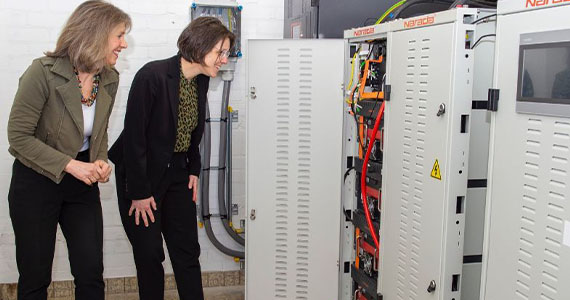ACCESS project helps build a greener future in European cities
Over the last four and a half years, industrial experts from IfM Engage have worked with an international group of collaborators to help four European municipalities undertake sustainability and energy transition projects through the ACCESS initiative.
Enabled by the project, local authorities in Amersfoort (Netherlands), Mechelen (Belgium), Malmö (Sweden) and West Suffolk (UK) have implemented innovative energy technologies and concepts in their communities, which have reduced the municipalities’ carbon footprint and boosted their bottom line.

Pilot projects for a better tomorrow
The aim of the project was two-fold:
- Supporting cities with a long-term vision of the climate and energy transition.
- Optimising the development process of pilot projects that contribute to accomplishing their goals and streamlining the technology scale-up.
The pilot projects of each municipality were unique and varied. In Amersfoort, the residents of the De Burgemeester Molendijkflat apartment building now benefit from having the first-of-its-kind battery in their basement. This battery stores and discharges energy from the building’s solar panels, providing demand-side response to the grid as needed. Not only does the system have green credentials but it will reduce tenants’ energy bills by up to 15%. Moving south to Mechelen, all tenants in the Keerdok Parking facility building share a local energy system that encompasses 419 solar panels generating power to charge cars, electric bicycles, and even supermarket fridges on-site. As a result, energy costs are reduced by 27.5%. The knowledge gained from the project has also enabled local authorities to facilitate grid-oriented energy system designs on all new city buildings.
Sege Park in Malmö is an innovative, multi-feature project. It is one of the largest wooden car parks in Europe, and thanks to the ACCESS initiative, it is fitted with 120 EV charging points, solar panels, and a 220kW battery. The energy is managed through advanced energy management software, and the system is expected to save local authorities €35,000 on energy costs through the winter. On local shores, small businesses in West Suffolk were offered help to identify energy efficiency potental that would save them approximately £62,000. Enabled by ACCESS funds, West Suffolk also set up a peer-to-peer energy trading platform aimed to help businesses who invest in solar panels to sell the excess generation to their neighbours in the business park.
The success of the pilots is testament to the potential of these concepts to help decarbonise local energy systems. A major challenge, however, is to translate insights and learnings into a scaled-up deployment of the concepts and to align the scale-up with existing initiatives and activities into a coherent strategic approach.
Finding the right tools
To support local authorities with the strategic planning and scale-up of the trialed technologies and concepts, Senior Solution Development Specialist Dr Diana Khripko and Head of Solutions Development Dr Nicky Athanassopoulou from IfM Engage collated the tools from a variety of disciplines such as strategy, technology and innovation management, energy system modelling, and behavioural and policy sciences, in collaboration with other academic partners. These tools were used to support the local authorities in the projects in all four municipalities. The toolbox remains available online and builds on expertise from IfM Engage and the three other knowledge partners involved in the initiative:
- IfM Engage: The Strategic Roadmapping Tool, used to create a united vision between stakeholders for the transition process in each municipality.
- VITO: The Urban Energy Pathfinder, used for cities to make informed plans for energy transition measures.
- Johanneberg Science Park: The Replication and Networking Tool, used to rank stakeholders and prioritise engagement to ensure results are shared with the right people.
- Greater South East Net Zero Hub: The Governance and Decision-Making Tool, used to identify the barriers and priority improvement actions to advance their own investment decisions and government structures.
“We have worked closely with local authorities and mapped different strategic issues that they face when developing and implementing their sustainability and energy transition strategies to deliver on the National and EU Net Zero targets,” says Diana.
“The IfM research and tool development has historically been driven by commercial and manufacturing challenges. ACCESS gave a unique opportunity to customise our tools and methods to the requirements of the public service and the local policy making processes, and to deploy them in this new context. This shows that in terms of the process our tools and methods are agnostic to the context and can be used in both ‘worlds’.”
The bulk of the work on the four projects took place during the Covid-19 pandemic, so most of the collaboration was done online. Luckily, there were opportunities to meet in person as well, with visits to the Johanneberg Science Park, Mechelen, Amersfoort, and Cambridge.
“Although the project formally came to a close last year, its legacy is poised to be long-lasting, with continuous benefits reaped from its innovations and new projects starting in its wake,” Diana concludes.
Find out more
- Access the e-book about the project.
- Hear Dr Diana Khripko talk about the project in this webinar.
